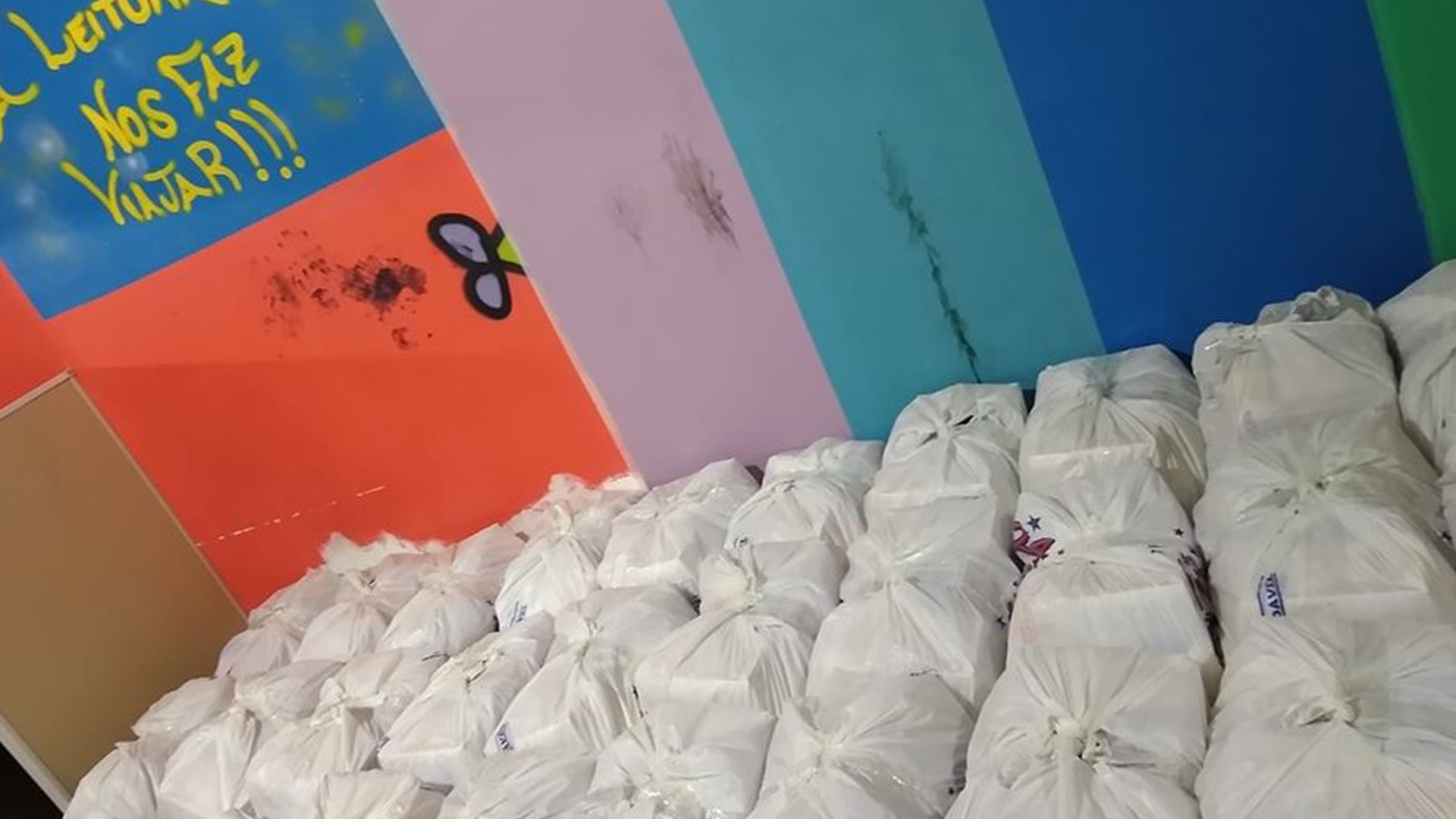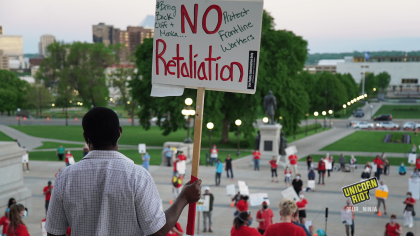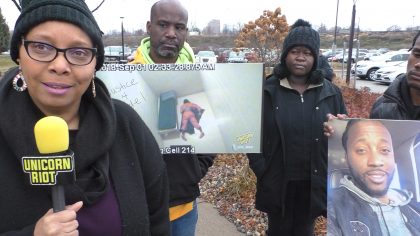The Coronavirus Crisis in Brazil – An Interview with EmiciThug
Espírito Santo, Brazil – With the fastest growing infection rates in the world, the coronavirus outbreak in Brazil is attacking the full spectrum of society. Numbers of confirmed cases are soaring and no one is exempt: from frontline health workers to residents of the favelas and elected members of the Cabinet, to Indigenous groups in the Amazon and beyond.
Mass graves are being dug, resources are being stretched, and hospitals are being overwhelmed from the current pandemic. Street organizations and collectives across the country are stepping up to help their communities. Meanwhile, armed militias connected to the president’s family and to the murder of Rio de Janeiro city councilmember Marielle Franco have set up a protest camp calling to re-open the country’s economy despite the record surge in cases.
Two health ministers have been fired or quit in the last month after disagreements with far-right president Jair Bolsonaro over his touting hydroxychloroquine and defying official health advice regarding physical distancing while consistently showing up at rallies to re-open the economy.
An active army general is now the interim leader of Brazil’s Ministry of Health, Eduardo Pazuello. He just signed protocols for the country to start using hydroxychloroquine to combat COVID-19 although 11 Brazilians recently died from a small phase high-dose study, and possibly hundreds have died self-medicating at home.
To get some context behind what life is like in Brazil, we spoke to EmiciThug, an artist and community activist living in the favelas of Nova Rosa da Penha, Cariacica, Espírito Santo, Brazil. He gave us an update of the situation from a Brazilian perspective along with a timeline of events and concludes with optimism for the future, pointing to emerging mutual aid collectives in Brazil that are bringing “hope in the midst of chaos for many people.“
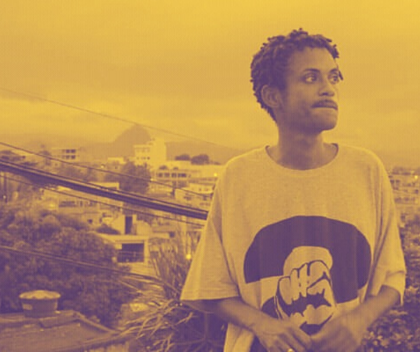
Unicorn Riot: How was the arrival of coronavirus seen from a Brazilian viewpoint?
Flavio: When the first information about a new coronavirus in the world emerged — after a series of people were afflicted with an unknown pneumonia in the city of Wuhan, in China — the Brazilians made fun and the ‘memes’ flooded social networks. At first, few detected the real seriousness of the problem; after all, it was on the other side of the world, Brazil would hardly be affected. Until the virus spread throughout the world: Italy, Spain, America…
Through a strong influence of the national capitalist media, almost everyone in the country started to adhere to the practice of xenophobia, either producing and/or reproducing hate speech against China and its people, seen at that time as the main culprits for the virus’ emergence and proliferation.
On February 4, 2020, the risk rating in Brazil went from level 2 (imminent danger) to level 3 (public health emergency). On February 26, 2020, right after the annual carnival, the Ministry of Health confirmed the first case of COVID-19 in Brazil: a 61-year-old man living in the city of São Paulo, located in the Southeast of the country. He had returned from a trip to Italy and tested positive at the Albert Einstein private hospital. It is worth remembering that the patient has recovered.
After the first case, 20 other possible instances were under investigation. Gradually, the Brazilian people, exposed with exhaustion by the national and international media, began to exchange jokes for safety protocols such as the use of alcohol in gels and masks.
#Brazil | In response to the new coronavirus, we are carrying out health promotion activities, triage and basic consultations, as well distributing hygiene kits in Rio de Janeiro.
Watch this video to understand more⬇ pic.twitter.com/M7h4Kdvmpd
— MSF International (@MSF) May 16, 2020
Unicorn Riot: What kind of government measures have happened?
Flavio: It wasn’t until April 3 that Law No. 13,982/20, popularly known as the Emergency Aid Law, was signed, which will make available for a period of three months an amount of R$600 ($105 USD) for informal workers, individual micro-entrepreneurs, taxpayers, social security, and unemployed people. Approximately 98 billion reals ($17.1B USD) were made available. Unfortunately, people who did not need the assistance registered, which caused the system to present a problem, making access to the assistance difficult for those who really need it.
The advance of the pandemic in Brazil increasingly called for other preventive and security measures, one of which would be social isolation, which is little embraced by some Brazilian regions. It is worth noting this measure would be very much criticized by the current president and the Brazilian elite.
Media and profitable campaigns like #StayAtHome reached Brazilian homes with the same proportion that inequalities were wide open.
It is very easy to stay at home when you are an heir and you can enjoy all the historical perks directed to the privileged (white) class, but imagine a father or mother of the household, head of the household, without a job and without income adhering to this campaign?! The #StayAtHome sounds like outrage.
On April 16, 50 days after the first coronavirus case in the country was registered, Brazil recorded deaths in all states.
At least 92 Indigenous people in Brazil’s Amazon have died from #COVID19.
Deforestation is surging, and experts say illegal loggers risk exposing remote communities. Indigenous groups say they’re backed by a govt that “wants to completely destroy the country’s first peoples.” pic.twitter.com/5F0SP3BJdY
— AJ+ (@ajplus) May 18, 2020
Unicorn Riot: How has life in the favelas been affected?
Flavio: The favelas had their natural habitat drastically affected as streets were deserted of people and most commercial establishments are closed or partially functioning.
A good part of the Brazilians are living a war ‘without a vest and without ammunition’, where the main victims are, as always, the Black, poor and slum people, and Indigenous people too.
While the government of the fictitious President Jair Messias Bolsonaro (Without Party), motivated by Bolsonaro’s lewd speech that “the people want to work” — which is being reproduced across the country by bosses in caravans that look more like luxury car fairs — insists on reopening the trades and obliging the return of workers (those who were not thrown by their own luck) to their respective companies.
The State of Rio de Janeiro, located in the Southeast of the country, presents some cases of localities dominated by organized crime that, following worldwide guidelines to prevent the spread of the virus, whether for business reasons or because they are unable to seek medical attention if infected, they have taken, even before the State, measures aimed at the common welfare.
Leaders of factions in the following Rio de Janeiro communities declared curfew: Cidade de Deus; Jacarezinho; Jacaré and Santo Amaro, both communities under the control of CV (Comando Vermelho); and São Carlos and Macaco, both controlled by TCP (Terceiro Comando Pure).
“As of eight o’clock at night, I said eight o’clock at night, whoever is on the street will get a concealer;” so said the message that came from a sound car that circulated in Cidade de Deus, Rio’s first community to confirm a case of coronavirus, in January.
Brazil’s gangs have put the favelas on lockdown to prevent an outbreak of COVID-19. They know that the virus came to Brazil through wealthy jet-setters, and will do “whatever it takes” to stop the gringos from entering the favelas.
Watch our report here: https://t.co/9n4aVaW6eg pic.twitter.com/aqqyDfhntR
— redfish (@redfishstream) April 30, 2020
Unicorn Riot: How is inequality playing a role in the pandemic’s effects?
Flavio: Regardless of gender, race, social class, sexual orientation, or religion, all Brazilians in their right mind understood the lethality of the virus and the risks of not following the WHO (World Health Organization) safety standards, but unfortunately this is Brazil, a place where money rules, needs oblige and common sense disappears.
The historical social inequality that has prevailed in Brazil since the period of slavery (1530 – 1888) highlights the difference between the poor and the rich people, given the limited access had by a large part of the population to the protocols of security and prevention of contagions. Washing one’s hands with soap, buying gel alcohol, and practicing social isolation are almost nil in the least-favored parts.
Masks became luxury accessories. Gel alcohol or 70% alcohol runs out even before arriving. Few people have access to these items which are indispensable at the moment.
In 2018, 13.5 million Brazilians lived below the poverty line, with a monthly income below R$145 ($25 USD).
While the people are at the mercy of the virus, without a concrete answer on ways to control and combat the pandemic, commercial establishments began to overprice the value of their products. For example, before the pandemic, 5kg of rice sold for up to R$12, it’s now selling for R$17, and cooking gas that previously sold at R$60 is now going for R$100 ($17 USD). Both items, depending on the region, suffer changes in values, more or less. In some cases it is necessary to activate PROCON (Consumer Protection and Defense Program), so that abusive values return to normal.
RELATED – “Enough of Being the Blood that Promotes Fascists”: Viewpoints From Brazil
Studies by Imperial College in London carried out in 48 countries show that Brazil has the highest number of contagions due to coronavirus in the world. Each infected person transmits the virus on average to three people in the country.
As the most-affected place in Brazil, we have the State of São Paulo with 62,000 confirmed cases and almost 5,000 deaths as of May 18, 2020. The youngest victim recorded so far was a five-day-old newborn, who died in city of Natal (Rio Grande do Norte).
Insecurity and uncertainty affect the emotions of the Brazilian people, many of whom, due to the recent crisis (2014 to the present day), had to reinvent themselves and informally exercise some function, in order to at least be able to bring their livelihood to their respective homes.
While a good part of the Brazilian population strictly follows the quarantine guidelines imposed by municipalities and states, it’s as if another large part of the population is on vacation, filling beaches and bars, making barbecues… Irresponsibly they are leading the push to go back to living ‘normally.’
So far, as of May 22, 2020, there are over 331,000 confirmed cases, over 21,000 deaths, and 135,000 recovered patients, with many deaths still under investigation.
Brazilians banged pots & pans this evening in protest against pres Jair Bolsonaro & his insistence on reopening the economy, even as #covid19 deaths rates spiral. He postponed his speech this evening & will address supporters tomorrow in Brasília. #Brazilpic.twitter.com/tdABwQRh3V
— Michael Fox (@mfox_us) May 16, 2020
Unicorn Riot: What is the impact of this politically – how do people view Bolsonaro?
Flavio: With the exception of his loyal supporters, a notorious dissatisfaction has been expressed on the part of the people (even some of its voters) at the measures and posture taken by Bolsonaro. Some already see Vice President Mourão as the best option for this national feelings of an orphaned president.
Internally, some former allies have become public enemies of the government for simply doing good work and following the guidelines given by WHO. The former Minister of Health Luiz Henrique Mandetta was recently fired for not complying with the posture and directions of this irresponsible being that we have as president, and the next one quit. And the former Minister of Justice, Sergio Moro — this last key piece for the 2016 coup that Brazil and ex-president Dilma Roussef suffered — resigned after Bolsonaro fired the police chief who was investigating Bolsonaro’s family.
If the crisis caused by the COVID-19 pandemic were not enough, the recent dismissal of Moro shows that on the national scene another crisis is opening up with almost the same dimension of lethality: the political crisis, packed with public clashes between the governor of São Paulo, João Dória, and the stupid president Jair Messias Bolsonaro.
There is a certain movement on the part of some ‘representatives of the people’ in municipal and state governments, in the Chamber of Deputies and in the Senate, to boycott the measures taken by the federal government. But what you see is a lot of talk and little action on the part of politicians.
Unfortunately the politicians we elect are, for the most part, thinking only of elections — either the municipal ones, which take place in October 2020, or the presidential elections, which take place in 2022. Many are using this moment to campaign and pretend to help and care about the poor.
In the municipality of Cariacica, located in the Southeastern State of Espirito Santo, Mayor Juninho has provided a channel through the Municipal Secretariat of Social Assistance for registering citizens who need basic food baskets. The registration should be made through a telephone number made available in the Official Gazette of the municipality. In principle about 350 people would be served daily, except that since the channel was made available, just a few people have managed to have been served; almost always the number is unavailable, just ringing or going straight to voicemail.
The city of Maricá, Brazil shows us a #COVID19 response rooted in local #solidarityeconomy institutions, and demonstrates the “power of permanent policy structures to offer rapid emergency responses that favor mutual aid.” 📈👊🏾https://t.co/3oAZ8LXFSa via @BostonReview pic.twitter.com/gtdBYc7rKC
— NewEconomyCoalition (@NewEconomics) April 28, 2020
Unicorn Riot: Are people in the favela working together to share any resources or provide any support to each other?
Flavio: The Emergency Aid provided by the federal government has worked a little bit. However, it also presents problems, since some registrations are still pending analysis.
With the increase in cases of COVID-19 and families needing support such as food and hygiene products among other supplies, many people and collectives have emerged in Brazil with the mission of becoming something like hope in the midst of chaos for many people.
This is the case of the peripheral collective Minas Da Quebrada, located in the Flexal 2 neighborhood in Cariacica. Directed by Lia de Oliveira, in partnership with other organizations, the collective gathers and distributes basic baskets and cleaning kits and alcohol gel in the region, and all of this, in her own words:
“Without ever exposing any of ours, without no photo, no embarrassment for our brothers and sisters who are, as well as us, facing moments of difficulties.“
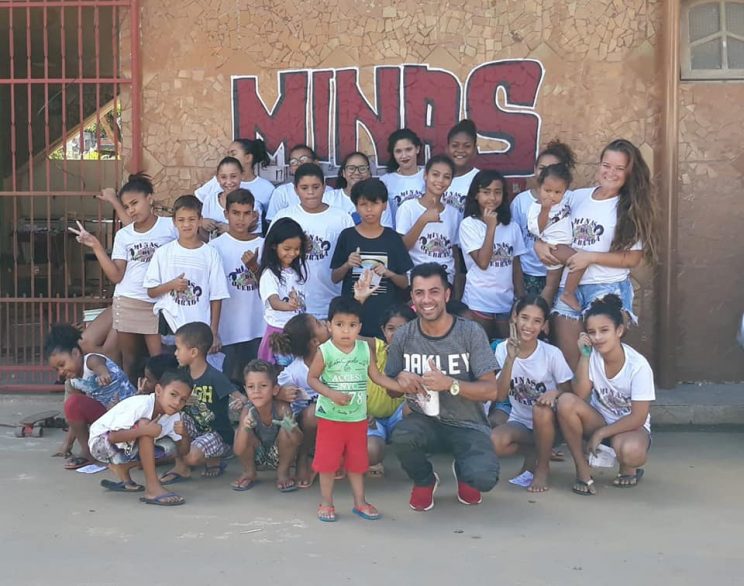
Examples like this make us believe that human beings still exist. And as 2Pac already said: “Never surrender. Everything is based on your faith.” For these reasons and others, I believe that TOMORROW WILL BE BETTER!
This Saturday night at 5 p.m. CDT (7:00 p.m. BRT) EmiciThug is doing a live stream on his Facebook and Instagram pages called Vision of the Creative and will also soon be starting his own mutual aid fundraising effort to feed families.
Last May, Unicorn Riot published our first interview with EmiciThug on Bolsonaro, the quilombos and resistance through rap. The article also featured another Brazilian, Hugo Souza, who connected the rise of fascism in Brazil with that of the far-right in the United States. Read that interview here, “Enough of Being the Blood that Promotes Fascists“: Viewpoints From Brazil.
Cover image provided by EmiciThug shows mutual aid collected by CriAtividade Collective and distributed in Cariacica, Brazil.
Follow us on X (aka Twitter), Facebook, YouTube, Vimeo, Instagram, Mastodon, Threads, BlueSky and Patreon.
Unicorn Riot's COVID–19 Coverage:

- “Brazil is Asking for Help” – Artists and Activists Speak Out - April 10, 2021
- Brazilian Pandemonium: COVID-19 Kills Over 300K - March 27, 2021
- COVID-19 Deaths in Minnesota Prisons Continue to Rise - February 17, 2021
- Brazil Nears 200K Deaths as Politicians Continue to Downplay COVID-19 - December 20, 2020
- Winter of Coronavirus: Seeking Shelter in Minneapolis During COVID–19 - December 14, 2020
- Denver Sweeps 300+ Tent Encampment Residents - November 30, 2020
- Unhoused Community Forms Tenants Union, Constituents Protest at Commissioner’s Home - November 11, 2020
- Minneapolis Prioritizing Park Sweeps Over Sheltering the Unhoused - October 29, 2020
- Court Protest Aims at Boston Covid Housing Crisis - October 29, 2020
- Philly Starbucks Worker Delivers NLRB Unfair Labor Practice Complaint - October 15, 2020
- Demands Reignite for Releases from GEO ICE Jail Amid New Covid Outbreak - October 5, 2020
- Peavey Park Sanctuary Homeless Camp Evicted in Minneapolis - September 24, 2020
- New Month Brings Added Urgency To Minneapolis’ Housing Needs - September 2, 2020
- COVID–19 Testing DeMystified at Community-Informed Coronavirus Testing Site - August 29, 2020
- Sanctuary Camp Residents Pressured to Move, No Housing Solution In Sight - August 22, 2020
- Coronavirus, Corruption, and Resistance: Life Under South Africa’s Lockdown - August 17, 2020
- Authorities Visit Loring Park Tent Encampment, Bring Eviction Scare - August 10, 2020
- Minneapolis Park Police Displace Sanctuary Encampment - July 22, 2020
- Homeless Philadelphians Moving Into Vacant City-Owned Homes - June 22, 2020
- Encampment to ‘Free Them All’ Outside GEO ICE Detention Center - May 26, 2020
- The Coronavirus Crisis in Brazil – An Interview with EmiciThug - May 22, 2020
- Nurses Picket Over Lack of Protection From Ongoing Viral Pandemic - May 21, 2020
- Mutual Aid to Detained Refugee Women Grows — Coronavirus in Greece Part 3 - May 7, 2020
- Minneapolis May Day Protest Supports Essential Workers - May 2, 2020
- MN Demonstrations, Demands to Free Prisoners Escalate - April 30, 2020
- Denver ‘Clean-ups’ Displace 100+ Unhoused Residents Amid Health Crisis - April 30, 2020
- Worker-Occupied Factory Sends Soap to Refugee Camp – Coronavirus in Greece, Part 2 - April 28, 2020
- A Country Quarantined, Coronavirus in Greece Part 1 - April 25, 2020
- Who’s Calling to ‘Liberate Minnesota’, and Why? - April 21, 2020
- Living with COVID–19 - April 17, 2020
- Philly Mayor and Judges Pressured To Release Inmates From Jail - April 15, 2020
- Calls for Rent and Mortgage Freeze Outside MN Legislature - April 14, 2020
- What Is Coronavirus and How Do Humans Defeat It? - April 10, 2020
- Car Protest Demands Philadelphia Officials Release Prisoners To Save Lives In Pandemic Crisis - April 10, 2020
- ‘Cancel Rent’ Demo Calls for a Rent and Mortgage Payment Freeze as COVID-19 Spreads - April 9, 2020
- Coronavirus in the Caribbean: COVID–19 Update from Puerto Rico - April 2, 2020
- ‘Never Again’ Demo Demands Release of Detainees Amidst COVID–19 Pandemic - March 30, 2020
- South Africa Under Lockdown as COVID–19 Spreads - March 29, 2020
- Providing Mutual Aid Amidst the Coronavirus Pandemic in Minnesota’s Twin Cities - March 27, 2020
- As U.S. Coronavirus Cases Top the World Charts, Minnesotans’ “Stay at Home” Order Goes Into Effect - March 27, 2020
- “Everyone Deserves A Cost-Of-Living Adjustment”: Interview with UCSC Striker Yulia Gilich - March 26, 2020
- ‘Real boog hours’: Neo-Nazi Terror and the Coronavirus Crisis - March 20, 2020
- Coronavirus Concerns End St. Paul Educators Strike, Close Many Public Schools - March 14, 2020
Please consider a tax-deductible donation to help sustain our horizontally-organized, non-profit media organization:

Unicorn Riot's Coverage From Brazil:
- ‘Marielle, Presente’ – March Marks Feminist Struggles in Brazil - April 13, 2023
- Over 100 Families Occupy Abandoned Apartment Complex in Brazil - February 20, 2023
- Bolsonarist Extremists Attack Brazilian Government a Week After Lula Inauguration - January 12, 2023
- Elder Woman Released After 27 Years of Slave-like Servitude in Brazil - January 5, 2023
- With Lula Elected President of Brazil, the Left Consolidates itself as a Power in South America - November 9, 2022
- Elections in Brazil: Second Round Slated for October 30 Between Lula and Bolsonaro - October 7, 2022
- Ribeirão Favel’Arte, Festival of Arts and Culture in Brazilian Favelas - September 7, 2022
- Indigenous Official and British Journalist Murdered in Brazilian Amazon - July 7, 2022
- ‘Bolsonaro Never Again’ Protests Come Among New Wave in Government Scandals - May 19, 2022
- COVID Commission Finds Bolsonaro Committed “Crimes Against Humanity” - December 15, 2021
- Brazil: 600K Deaths, Emergency Aid Ends, Protests Continue, & People Call for Lula 2022 - October 9, 2021
- Brazil: Mutual Aid During COVID-19 and Bolsonaro’s Mismanagement - September 19, 2021
- Police in Brazil Killed Record Amount of People in 2020 - September 8, 2021
- Are the “Fora Bolsonaro” Protests Enough? - August 26, 2021
- Brazil: Hoping for a Vaccine, Food on the Plate and #ForaBolsonaro - July 9, 2021
- Brazil: The People, at Last, Took to the Streets - June 3, 2021
- The Invisible “THEY” - Apr. 29, 2021
- “Brazil is Asking for Help” – Artists and Activists Speak Out - Apr. 10, 2021
- Brazilian Pandemonium: COVID-19 Kills Over 300K - Mar. 27, 2021
- Brazil Nears 200K Deaths as Politicians Continue to Downplay COVID-19 - Dec 20, 2020
- Echoes of George Floyd in Brazil: Man Kneeled On, Killed by Security Guard - Nov 23, 2020
- The Coronavirus Crisis in Brazil – An Interview with EmiciThug - May 22, 2020
- “Enough of Being the Blood that Promotes Fascists”: Viewpoints From Brazil - May 15, 2019
